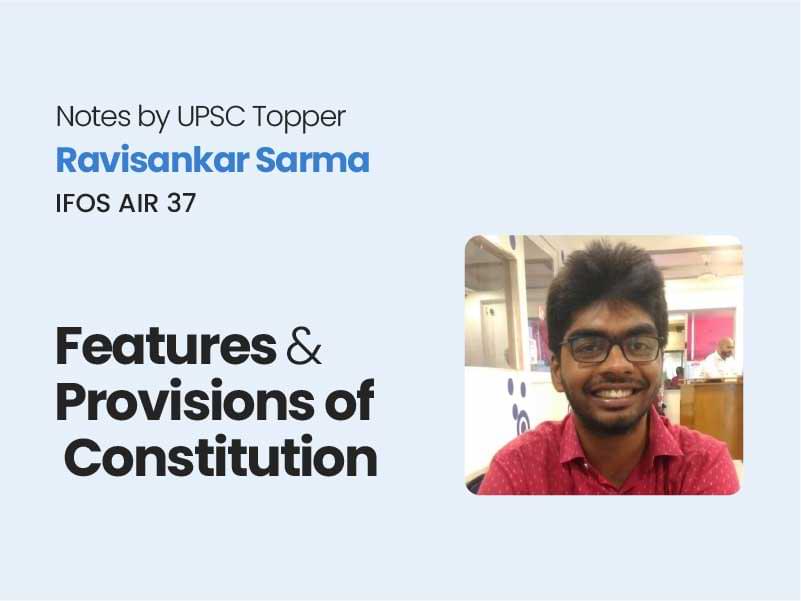Companion@360 → 7 Month programme to sharpen your writing skills → REGISTER NOW

Features and Provisions of the Constitution
Constitutionalism
It is a political doctrine which means the power of leaders and government bodies is limited by provisions that are enforced through established procedures. Constitutionalism guarantees the claims of citizens against the state and ensures powers, rights and obligations of both citizen and state are well defined in a contractual relationship.
Passive Euthanasia
The Supreme Court in Common Cause vs Union of India upheld Passive Euthanasia through the concept of living will whereby a patient makes an advance directive for withdrawal of medical treatment. Any adult with sound mind can express the will in clear and unambiguous terms based on informed consent. A guardian or close relative is to give the go ahead for passive euthanasia in cases circumstances within the living will arrive.
Evolution of the Verdict
In the P. Ratinam vs Union of India case, the Supreme Court recognized the right to die as inherent in right to dignified life. It struck down IPC 309 thus decriminalizing suicide.
In the Gian Kaur vs State of Punjab case, Supreme Court reversed its stand stating that the right to die is not part of the right to life holding both euthanasia and suicide as unlawful. Right to die, the SC then opined was inconsistent with a dignified life
In the famous Aruna Shanbaug vs Union of India case, the Supreme court allowed passive euthanasia in exceptional circumstances under strict monitoring of the apex court.
Why Passive Euthanasia?
- Right to Die with Dignity: The Supreme Court has upheld that passive euthanasia can provide a dignified death to a dying patient who may be forced to undergo pain due to unwarranted medical support. The right to a dignified death is included in right to a dignified life guaranteed by Article 21 of the Indian constitution
- Justice Chandrachud’s Court: “To deprive a person of dignity at the end of his life is to deprive him of meaningful existence”
- Omission Process: As opposed to active euthanasia, passive euthanasia does not wilfully accelerate the process of death. It merely allows the natural course of death to take over suspending any medical assistance to the patient. Thus, the ethical issues arising from it are minimal in comparison to active euthanasia
- Pain relief: A dignified death for terminally ill patients can spare them and their family agony of being in a precarious medical condition
- Savings for the Family: Life support systems and medical assistance comes at great economic cost for families while they simply prolong the inevitable worsening the suffering. Euthanasia can relieve them of the meaningless financial stress that is placed on the family
Scope of Passive Euthanasia on Fundamental Rights
- Dignified Death under Dignified Life: Widening interpretation of Article 21
- Right to Bodily Integrity under Article 21
- Freedom of choice of treatment under right to personal liberty in Article 21
- Right to privacy as identified in Puttuswamy vs Union of India
- Freedom of Religion:
- Passive Euthanasia can be interpreted to be in line with the voluntary practice of human sacrifice in many religions. Thus, it widens the boundaries of Article 25 also that grants freedom to practice any religion.
- Jain practice of Santhara and Sallekhana
- Passive Euthanasia is also in conflict with many religions which are opposed to the idea of suicide or euthanasia
- Passive Euthanasia can be interpreted to be in line with the voluntary practice of human sacrifice in many religions. Thus, it widens the boundaries of Article 25 also that grants freedom to practice any religion.
Issues with Passive Euthanasia
- Alternative Palliative care as an option for relieving pain
- Right to be killed: Technological determinism in the field of healthcare may lead to involuntary and non-voluntary euthanasia giving doctors power to decide on life of a patient. Whether the consent is informed or not needs to be observed
- Duty to Kill on doctors on the directive of the patient
- Duty to Die: Right to die may be misused by some at the expense of vulnerable communities to force them into accepting death
Way Forward
- Assess mental health of patients to ensure consent is informed and without alternatives
- District Level Doctors Panel: The M R Rajagopal Committee recommends a district panel to process the living will that is made of District Medical Officers
Active Euthanasia
Active Euthanasia refers to the practice of ending a life of an individual suffering from an incurable disease. Passive euthanasia only withdraws medical support while active euthanasia includes an active intervention to end the life of individuals
Read Also Health Sector in india
Supreme Court’s Stand
While Passive Euthanasia remains legal through the concept of living will, active euthanasia is unlawful. Suicide involves overt acts culminating in unnatural death
Issues with Active Euthanasia
- Possibility of Misuse: Active euthanasia performed by an act of commission can be manipulated and misused to end life of those suffering from curable diseases
- Lack of Awareness in Choice: The patients opting for active euthanasia may not be making an informed choice with regard to active euthanasia administering
- Organ Rackets: Active euthanasia might be misused to extract and sell organs of patients for illicit monetary benefits
Right to Convert
The scope within Fundamental Rights
- Article 25: Freedom of conscience to choose one’s own religion, profess and practice it. Right to convert is implicit in freedom of religion. However, the right to propagate one’s own religion does not entail the right to forceful conversion of another into one’s own
- Right to Privacy: The choice of a religion is an individual autonomous decision part of the individual private sphere
- Article 21: Individual exercises his personal liberty in converting or choosing a religion
Issues
- Anti-Conversion laws: Implemented and in force in M.P, Uttarakhand, Jharkhand and Odisha, they have been criticized to abridge freedom choosing one’s own religion
- Religion not defined in the Constitution
- Coercive Conversions: The role of coercion in conversion for terrorism and for numerical gains has been noted. Anti-conversion laws have evolved as an instrument to tackle them.
Court Judgements
- Hadiya vs Union of India: The SC held that the right to marry and choose religion is an intrinsic part of meaningful existence. Neither the state nor patriarchal supremacy can interfere in an individual’s decision
Conclusion
Right to conversion shall be an intrinsic and implicit part of freedom of conscience of religion ensured by Article 25 as long as it is without elements of fraud, allurement or coercion
Read Full GS Notes

